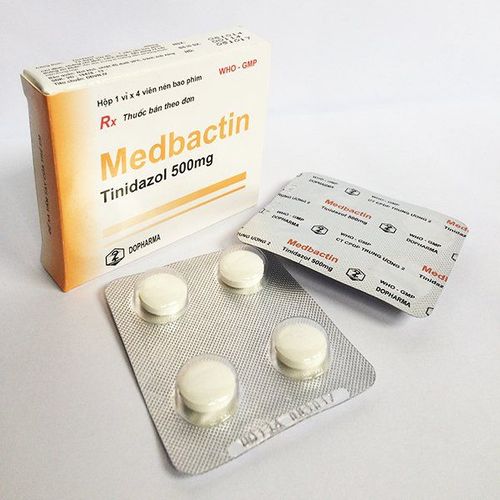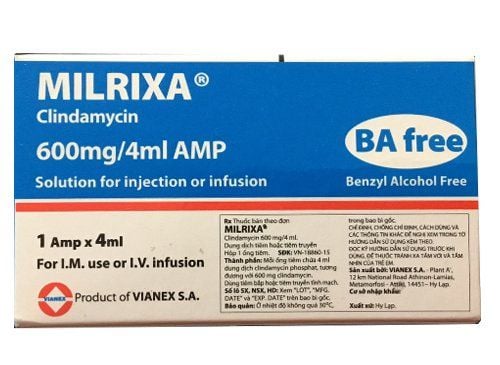This is an automatically translated article.
Tzide is usually prescribed by doctors to treat infections caused by anaerobic bacteria. During the use of Tzide, patients need to follow the treatment plan recommended by the doctor to minimize the risk of side effects and help the disease heal faster.
1. What is Tzide?
Tzide belongs to the group of drugs that are antiparasitic, antifungal, antiviral and anti-bacterial. Tzide drug is used according to a doctor's prescription, treating infections caused by anaerobic bacteria, such as sepsis, abdominal, gynecological,...
Tzide drug is made in the form of tablets. film-coated and packed in boxes of 10 blisters x 10 tablets. Each Tzide tablet contains the main active ingredient, Tinidazol, 500mg and other excipients just enough.
2. What are the uses of Tzide?
2.1. Uses of the drug Tzide The main active ingredient Tinidazol in the drug Tzide is a derivative of Imidazol, which has antiprotozoal effects on protozoa and against some anaerobic bacteria, including:
Trichomonas vaginalis; Giardia lamblia ; Entamoeba histolytica; Bacteroides melaninogenicus; Bacteroides fragilis; Peptostreptococcus spp; Veillonella spp; Peptococcus spp; Eubacterium spp; Clostridium spp; Fusobacterium spp; Bacteroides spp. The anti-infective effect of Tzide drug is based on the mechanism of penetration into the cells of microorganisms, then inhibiting the synthesis of DNA or destroying their DNA chains. In addition, Tzide is also used to prevent and treat infections of the gastrointestinal tract, biliary tract, abscess, and anaerobic infections such as gaseous necrosis or necrotizing fasciitis.
2.2. Indications for the use of Tzide drug Tzide drug is usually prescribed by doctors to be used in combination with some other antibiotics to treat and prevent the following infections:
Prophylaxis of infection after gastric surgery , colon and gynecology; Treatment of intra-abdominal infections such as abscesses or peritonitis; Treatment of gynecological infections such as endometritis, endometritis and tubal abscess; Treatment of respiratory infections such as lung abscess, edematous pleurisy or pneumonia; Treatment of skin or soft tissue infections; Treatment of acute gingivitis; Treatment of nonspecific vaginitis; Treatment of amoeba infections residing in the liver or intestines; Treatment of Giardia or Trichomonas urogenital infections. 2.3. Contraindications to the use of Tzide Do not use Tzide for the following subjects:
Patients with hypersensitivity or history of allergy to the active ingredient Tinidazol or any other active ingredient in the drug; Tzide is contraindicated in subjects with hematopoietic disorders or a history of acute porphyria; Do not administer Tzide to patients with organic neurological disorders; Women who are pregnant in the first 3 months of pregnancy or breast-feeding should not take Tzide without consulting a doctor.
3. Dosage and instructions for using Tzide
3.1. Dosage of Tzide drug Dosage of Tzide is usually recommended by doctors based on the patient's age and infection status, specifically:
Prophylaxis of postoperative infections: Take a single dose of 2g ( 4 tablets) about 12 hours before surgery (for adults). Treatment of anaerobic infections: Take the first dose of 2g/day, then reduce to 1g/time/day or 500mg x 2 times/day (for adults). Treatment of acute gingivitis: Take a single dose of 2g/time (for adults). Treatment of nonspecific vaginitis: Take a single dose of 2g/time. Then treat 2 days in a row with 2g / time / day (4g total dose) to accelerate the treatment effect. Treatment of Giardia infection: Take a single dose of 2g (for adults) and 50-75mg/kg body weight/time (for children). Treatment of urinary tract trichomoniasis: Oral dose of 2g (adult) and 50-70mg/kg/time once. Treatment of intestinal amoeba infections: Oral dose of 2 g/time/day for 2-3 days (adults) and oral dose of 50-60 mg/kg/time for 3 consecutive days for children. Treatment of Hepatic Amebiasis: For adults, the total dose may vary from 4.5 to 12g based on the degree of virulence of Entamoeba histolytica. Patients may need treatment in combination with purulent drainage to accelerate the effectiveness of treatment. Treatment with Tzide for adults can last from 3 to 6 days. For children, the treatment dose for liver amoeba infection will be 50-60mg/kg/day/time and taken for 5 consecutive days. 3.2. Instructions for use Tzide drug Tzide is to be taken orally with filtered water in an adequate amount. When taking, the patient should swallow the tablet whole, avoid crushing or chewing it because this may affect the therapeutic effect.
Tzide is used in a single dose or taken after meals to not affect the stomach. Patients should strictly follow the doctor's recommendations on the correct dosage and use of the drug to achieve optimal treatment effects.
3.3. Treatment of Tzide Overdose When Tzide is taken more than prescribed, patients may experience reactions similar to Disulfiram . When experiencing abnormal neurological signs, the patient should stop treatment with Tzide immediately and notify the doctor to take measures.
Treatment of Tzide overdose usually focuses on treating symptoms and applying other supportive methods. Although most disulfiram-like reactions resolve spontaneously and are not life-threatening, some patients may occasionally experience severe hypotension and arrhythmias.
In the management of Tzide overdose, the physician may recommend administering respiratory support with oxygen or a mixture of 5% carbon dioxide and 95% oxygen mixture. In addition, measures to maintain circulation such as plasma or electrolyte solutions may also be used.
4. Side effects when taking Tzide
According to research, about 3% of people taking Tzide drug experience side effects, including:
Common side effects: Abdominal pain, nausea, loss of appetite, thrombophlebitis , temporary change in taste. Uncommon side effects: Diarrhea, vomiting, headache or dizziness. Rare side effects: Fever, allergic reactions, stomatitis, reversible leukopenia, peripheral neuropathy, skin rash, pruritus, exanthema, stomatitis, arthralgia, dark urine, ataxia or convulsions. When any of the side effects mentioned above appear, the patient should stop using the drug and notify the doctor immediately for remedial measures.
5. Things to note when using Tzide
5.1. What precautions should be taken while using Tzide? During the use of Tzide, patients should note the following:
When feeling dizzy, ataxia or cloudy consciousness, the patient should stop using the drug immediately. People with severe peripheral or central nervous system disease should consult their doctor before using Tzide. Alcohol should be avoided while taking Tzide because it can cause a disulfiram-like reaction with symptoms such as heart palpitations, vomiting, abdominal cramps or flushing. Tzide drug has the ability to cross the placental barrier and adversely affect the fetus, so absolutely do not use this drug in the first 3 months of pregnancy. Currently, there are no specific reports on the harmful effects of Tzide in the later stages of pregnancy, so patients should consult their doctor carefully before deciding to take the drug. Tzide is excreted in breast milk, so it should be avoided in lactating women and should only be breastfed for at least 3 days after stopping the drug. Tzide has a risk of headache and dizziness, so people who operate machinery or drive should be careful when using it. Store the medicine in a cool, dry place in an airtight container, away from direct sunlight. Do not use Tzide that has passed the expiry date. 5.2. Interactions with other drugs Tzide may interact when used with the following drugs:
Cimetidine when used with Tzide can inhibit the liver's metabolism of the active ingredient Tinidazole, leading to decreased elimination and increased toxicity. calculated on the liver. Rifampicin when used in combination with Tzide can increase the metabolism of the active substance Tinidazole in the liver, increase its elimination and reduce the therapeutic effect of the drug. Oral anticoagulants are less effective when co-administered with Tinidazole. Above is information about uses, dosage and precautions when using Tzide. To ensure safety for your health and maximize the effectiveness of your treatment, you need to take Tzide exactly as directed by your doctor.
Please dial HOTLINE for more information or register for an appointment HERE. Download MyVinmec app to make appointments faster and to manage your bookings easily.













